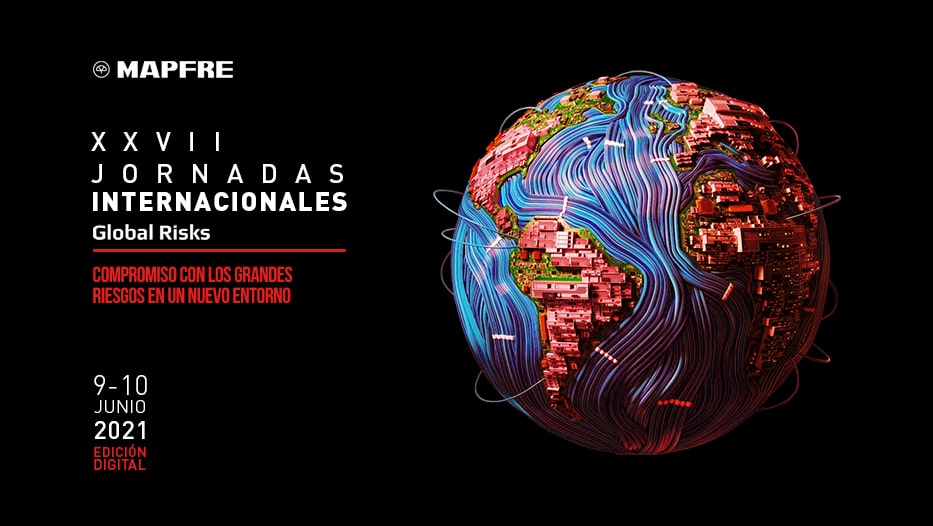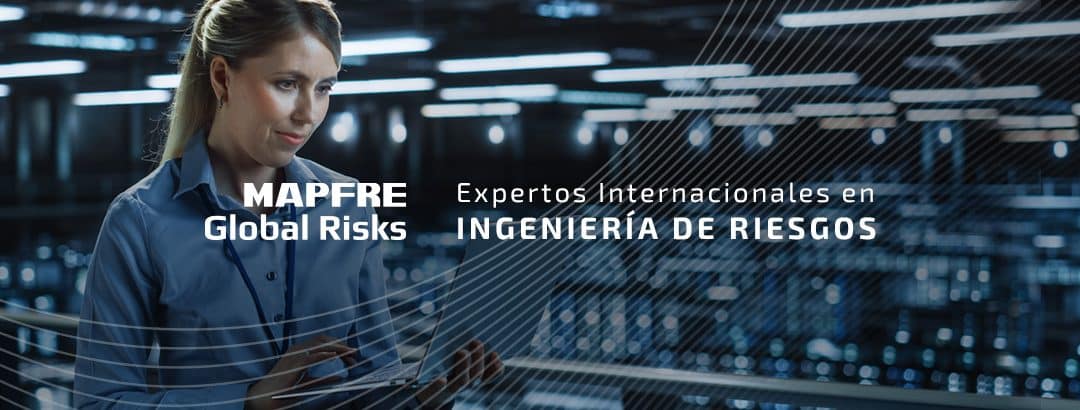admin | 02/07/2021
The cyber attack on MAPFRE, the challenges of large Latin American corporations in the current environment, the tightening of the insurance market, and the impact of medium-sized catastrophes on the industry were some of the topics discussed at the meeting.
With the theme “Commitment to large risks in a new environment,” MAFPRE held its Global Risks Seminar again this year in a new and atypical digital format made necessary by the current public health situation.
The meeting met the expectations of overall satisfaction and the audience level. More than 2,500 people in the field of large risks from 39 different countries watched the live stream of the digital sessions held over the event’s two days.
Francisco J. Marco, chairman of the board of MAPFRE Global Risks, opened the event giving a brief summary of the MAPFRE Group’s recent results: “So far in 2021, we have just closed out a very satisfactory first quarter, particularly given the difficult circumstances and the environment,” Francisco Marco stated, adding, “We have outstanding technical strengths, an efficient management model, and we have laid the foundations for a significant digital and cultural transformation.”
For his part, Bosco Francoy, CEO of MAPFRE Global Risks, focused his talk on the current global socio-economic context and its impact on the insurance market. He also summarized MAPFRE’s results and value proposition in the new environment. Additionally, he spoke about the strategic initiatives the business unit is working on, announcing the newly started initiative on Global Employee Benefit Programs, and he commented, “we hope that in 2022 MAPFRE will be able to send proposals and solutions to our clients in different countries.”
The schedule included three roundtable discussions:
Medium-sized catastrophes and their impact on the industry
The roundtable chaired by Javier San Basilio, Chief Underwriting Officer at MAPFRE RE, with participation by Tim Jehnichen, Executive Chairman of Munich Re in Spain, and Beat Kramer, Managing Director of Swiss Re, focused on the visible increase in medium-sized catastrophes, their impact on the industry, and the possible existence of reliable tools in the reinsurance market to provide an agile response to the catastrophes.
“Both climate change and socio-economic aspects are behind the increase in natural disasters.”
The three executives agreed that both climate change and socio-economic aspects are behind the increase in natural disasters, which require collective action in a fight that we are all part of.
How is the business insurance market evolving in the Spanish market and what is the role of brokers?
Santiago Martín, Deputy General Manager of Companies at MAPFRE Spain, chaired the second roundtable, which saw participation by the heads of large Spanish industry associations: Martín Navaz, Chairman of ADECOSE, Juan Carlos López Porcel, Chairman of AGERS, and Daniel San Millán, Chairman of IGREA.
During the discussion, the participants confirmed the overall concern of companies regarding the tightening of insurance conditions in their programs. In addition to the purely financial aspects, the participants showed their concern for the decreased capacity in some business lines, primarily financial lines and lines associated with cyber risks.
“The participants showed their concern for the decreased capacity in some business lines, primarily financial lines and lines associated with cyber risks.”
Additionally, the roundtable emphasized how commercial lines clients’ need to be supported by insurance companies in their international ventures.
Regarding this, the discussion highlighted the fundamental role played by brokers, as they search for and mediate the best solution for each client, in addition to the need for companies to implement an adequate risk management policy.
Large risks in Latin America, a present and future vision, was the central concept for the roundtable discussion chaired by Paola Serrano, CRMO Latam and International at MAPFRE Global Risks. Executives from three large corporations in the region, from different sectors and countries, participated in this discussion: Adolfo Carstens, CMPC Insurance Manager, Mariana Pizá, Global Insurance Director at ORBIA, Suzana Borges, Insurance & Warranty Director at LATAM Airlines Group.
“2020 has taught us a lot about what it means to be resilient, agile, empathetic, and, most of all, brave,” reflected Mariana Pizá, Global Insurance Director at ORBIA.
The discussion focused on how these companies managed the pandemic, its impact, and the changes experienced from a risk management standpoint.
The three agreed that people’s health and safety were the absolute priority of corporations, in addition to seeking continuity in their operations, including new ways of working. They also confirmed their organizations’ commitment to the environment and sustainability.
“Cyber threats are out there and have come to stay,” Guillermo Llorente during the third MAPFRE Global Risks Talk of the session on June 10.
The event continued with a MAPFRE Global Risks Talk between Bosco Francoy, CEO of MAPFRE Global Risks, and Guillermo Llorente, Corporate Security Director at MAPFRE.
Both executives spoke about the lessons learned following the cyber attack on MAPFRE in August 2020: how the cyber criminals acted, how the Group’s response took shape, and the lessons learned following the incident.
Guillermo noted, “Cyber threats are out there and have come to stay,” underlining the importance of prevention and training teams for these events—two factors which are essential to resolving them. Additionally, he highlighted the important role that transparency and communication play throughout the process.
After this talk, there was a presentation by Miguel Ferrandis, CFO of Acerinox, a multinational business group from Spain working in manufacturing stainless steel and nickel alloys. Ferrandis gave a presentation on the corporation, its activities, figures, and issues regarding the International Insurance Program.
Following his presentation, Bosco Francoy announced the winner of the International Award for Excellence in Risk and Insurance Management at MAPFRE Global Risks for 2019-2021, which was given to the client Sigdo Koppers, one of the most important business groups in Chile with operations on the five continents and highly diverse business areas that range from construction and industrial assembly, transportation logistics, and rock fragmentation to distribution and leasing machinery for automobiles.
Bosco Francoy announced the winner of the International Award for Excellence in Risk and Insurance Management at MAPFRE Global Risks for 2019-2021, which was given to the client Sigdo Koppers.
After this announcement, Bosco extended a hand to MAPFRE Chile, where Óscar Ortega, CEO of the company in that country, gave the award, which was received by Juan Pablo Aboitiz, General Manager of Sigdo Koppers, and Alejandro Reyes, Director Of Corporate Control at this company.
This was the second time that MAPFRE Global Risks gave this biennial award, which is intended to recognize the client who has done the best work in the field of risk management under criteria assessed by the MAPFRE Global Risks business areas and used to select the winner of the award from the candidates.
Antonio Huertas, Chairman and CEO of the MAPFRE Group, closed the event and summarized the conclusions, highlighting the importance of the insurance sector as a multiplier of economic activity and, as such, the important role it can play in the new post-pandemic era.
“No matter how much the world changes, there will always be insurance responses that can help you protect your assets,” Antonio Huertas, President and CEO of the MAPFRE Group, during the event’s close.
“The world we are going to find after the pandemic will have many different elements from what we experienced before March 2020. In insurance operations, changes will happen that will affect the fields of health, personal and business protection, mobility, etc. In this regard, the situation we are facing presents significant challenges for the sector and will lead to changes in our industry that, if we can anticipate them, we can make into opportunities,” Huertas stated.
To which he added, “We are working with you to manage those risks. Our primary role is to let you focus on your business and for us to adequately absorb the volatility inherent to the risks you take on. No matter how much the world changes, there will always be insurance responses that can help you protect your assets.”
Access to the full session of June 9
Access to the full session of June 10





